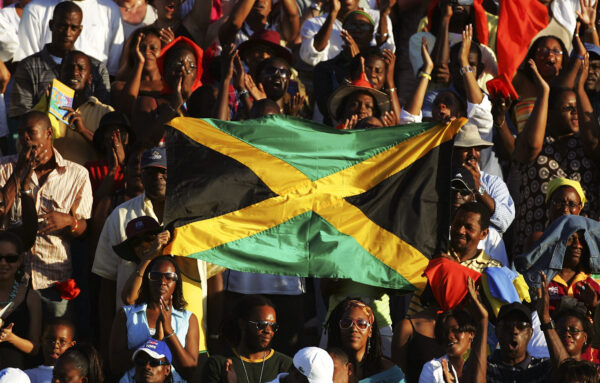‘We Gotta do Something ‘: Jamaica Issues Nationwide Ban on Music That ‘Glorify Criminal Activity,’ Notable Artists and Fans Speak Out
The Jamaican Broadcasting Commission recently announced plans to ban music and TV broadcasts deemed to glorify criminal activity, violence, drug use, scamming, and weapons to cut back on media that could give off the “wrong impression” of the Caribbean island.
In a statement captured by The Associated Press, Commission Chairman Lloyd Waller said these kinds of material such as this “could give the wrong impression that criminality is an accepted feature of Jamaican culture and society.”
TRELAWNY, JAMAICA – MARCH 11: Fans show off the Jamaican flag during the ICC Cricket World Cup 2007 opening ceremony at the Trelawny Multi Purpose Stadium on March 11, 2007 in Trelawny, Jamaica. (Photo by Clive Rose/Getty Images)
He added, “It could also unwittingly lend support to moral disengagement and further normalize criminality among vulnerable and impressionable youth and the young adult demographic.”
The new measure garnered mixed reactions from critics, including Jamaican entertainer and entertainment executive Romeich, who blasted the decision in a lengthy post on Instagram.
The “We Rise” musician said that “While I understand why people feel like this and even I don’t agree with glorifying guns or any use of any drug at all, we can’t stop the creatives (artistes) from singing about what they see around them or grew around.”
In a digital op-ed published by the Jamaica Observer, reggae artist Tanya Stephens wrote, “Every single time there is great pressure to curb crime or anti-social behavior, some of these very same unchanging heads meet again and roll out the same archaic ban as a ‘measure.’”
Yet, not everyone appeared opposed to the change, including one Twitter user who wrote, “Alotta ppl won’t like this but we gotta do something about the sensationalism & normalization of crime & scamming in our culture & I think banning it from mainstream broadcast is a start.” The online user noted that the change “won’t stop crime but I shouldn’t hear certain content so casually.”
Another added, “Agreed. Music used to be about love and fun and overcoming struggle not glorifying it and making up all these opps lol.”
One commenter highlighted the ban’s benefits for younger listeners, stating, “It won’t stop crime but will definitely reduce it. Most importantly it will prevent the corruption of the minds of impressionable youth.”
The commission attempted a similar ban in February 2009 to abolish music it deemed too sexually explicit. The new law went into effect immediately and does not apply to digital platforms.

